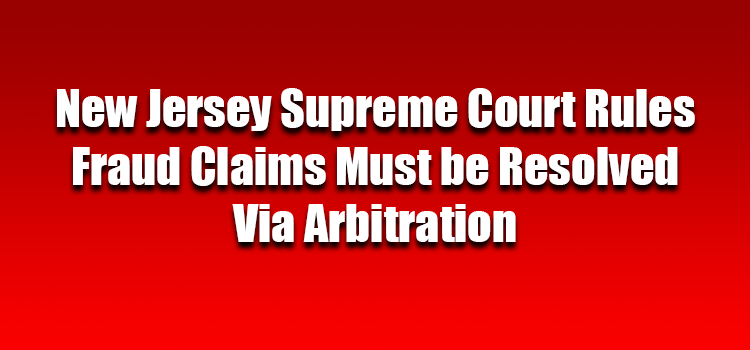
In Goffe v. Foulke Management Corp., (A-3/4-18/081258) (Decided June 5, 2019),the Supreme Court of New Jersey held that fraud claims regarding car dealership agreements must be resolved in arbitration. As emphasized by the court, U.S. Supreme Court precedent does not permit threshold issues about overall contract validity to be resolved by the courts when the arbitration agreement itself is not specifically challenged.
Facts of Goffe v. Foulke Management Corp.
The Plaintiffs both challenge the formation and validity of their sales agreements on the bases that the dealerships’ fraudulent practices and misrepresentations induced them to sign the transactional documents and that the agreements are invalid due to violations of statutory consumer fraud requirements. As part of the overall set of documents, plaintiffs signed arbitration agreements. Those agreements contained straightforward and conspicuous language that broadly delegated arbitrability issues to an arbitrator.
Plaintiff Sasha Robinson contacted Mall Chevrolet in Cherry Hill about buying a car and allegedly was told that, if she purchased from the dealership, she would have two days to change her mind, return it, and get her money back. Robinson moved ahead with the car purchase transaction that day. She signed several documents, including one that set forth the price of the new car, various fees, the price of the trade-in, and the deposit amount. That document included an agreement to arbitrate “all claims and disputes arising out of . . . [the] purchase of any goods,” including disputes as to “whether the claim or dispute must be arbitrated.” When Robinson sought to return the Malibu, she was told that the representation about being able to rescind the deal was a mistake, and that she was bound by the documents she signed. She alleges that the representatives attempted to “coerce” her into signing purchase documents.
Janell Goffe went to Cherry Hill Mitsubishi in response to an Internet advertisement for a Buick. Goffe was told that she could obtain the car that day if she traded in her 2006 Infiniti, paid $250 that day, and then later paid $750. She was told that financing on the Buick was approved. Goffe went ahead with the proposed deal and signed several documents, including an arbitration agreement identical in form to those that Robinson signed. When Goffe returned later with the remainder of the down payment, she was informed that financing had not been approved and that she could retain the Buick only if she agreed to a larger down payment and higher monthly payments. Goffe refused and cancelled the deal.\
In both cases, the trial court determined the arbitration agreements were enforceable and entered orders compelling plaintiffs to litigate their various claims challenging the overall validity of the sales contracts in the arbitral forum. The Appellate Division reversed. “The policy that favors arbitration does not exist in a vacuum,” the appeals court wrote. “Parties must have agreed to arbitrate before a judge may compel them to arbitrate,” it further explained. “[C]ourts do not offend the federal policy favoring [arbitration] when applying state contract principles.”
Court’s Decision in Goffe v. Foulke Management Corp.
The New Jersey Supreme Court unanimously reversed and reinstated the orders compelling plaintiffs to arbitrate the merits of their claims.
“The trial courts’ resolution of these matters was correct and consistent with clear rulings from the United States Supreme Court that bind state and federal courts on how challenges such as plaintiffs’ should proceed,” Justice Jaynee LaVecchia wrote on behalf of the Court. “Those rulings do not permit threshold issues about overall contract validity to be resolved by the courts when the arbitration agreement itself is not specifically challenged.”
In reaching its decision, the New Jersey Supreme Court emphasized that the U.S. Supreme Court has held that when a plaintiff raises a claim of fraud in the inducement of a contract as a whole—rather than fraud in the making of the arbitration agreement itself—the Federal Arbitration Act (FAA) mandates that the dispute be resolved by the arbitrator.
“Here, plaintiffs attack the sales contracts in their entirety, not the language or clarity of the agreements to arbitrate or the broad delegation clauses contained in those signed arbitration agreements,” LaVecchia wrote. “The [U.S.] Supreme Court’s precedent compels only one conclusion: an arbitrator must resolve plaintiffs’ claims about the validity of their sales contracts as well as any arbitrability claims that plaintiffs may choose to raise.”
She added: “The Court’s determination recognized that arbitration agreements are severable from the rest of the contract, and that the arbitration agreement may be valid separate and apart from the contract as a whole, provided that a party has not challenged the arbitration agreement itself.”
